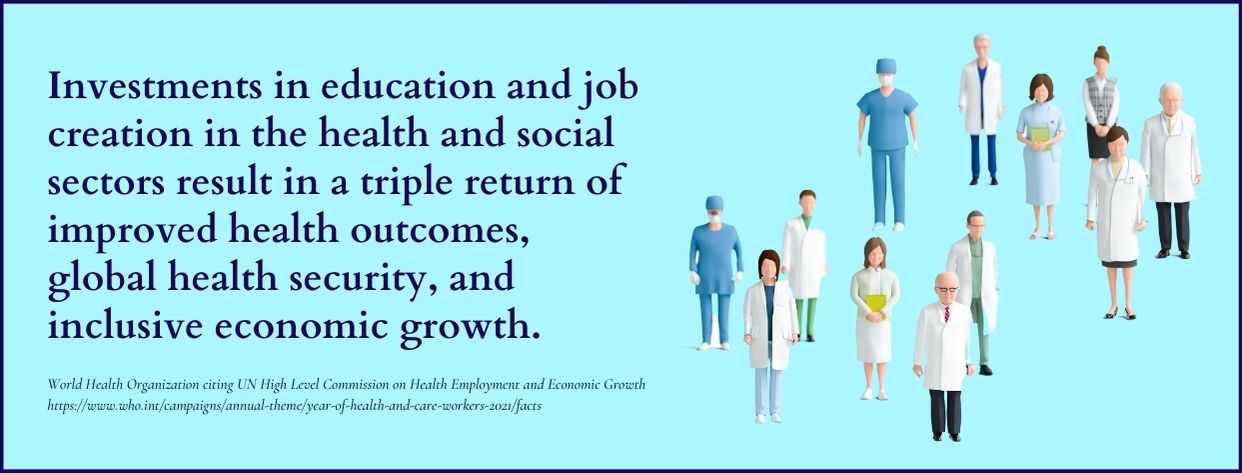Find Your Perfect School
A short-term healthcare training certificate allows you to begin a well-paid career with great job security without spending years and thousands of dollars on college. For less than two years, healthcare certificates will develop the job-specific skills needed for entry-level clinical professions that are hiring.
Need to find a short-term healthcare certificate program? Look for further! Just click the link!
According to the BLS, healthcare support and practitioner occupations will be the United States’ fastest-growing group adding 1.8 million jobs by 2032.

Completing a short-term healthcare training certificate program will open doors to work at:
- mental health hospitals,
- ambulatory surgical units,
- skilled nursing facilities,
- women’s health clinics,
- and many more.
Let’s review some in-demand healthcare vocations where simply a certificate will do.
Surgical Technologist
Surgical technologists don their scrubs after healthcare training certificate programs of eight to 18 months to support surgeons in operating rooms. Their responsibilities include:
- sterilizing instruments with multi-enzymatic cleansers,
- counting inventories,
- shaving incision sites,
- positioning suction tubes,
- taking lab samples,
- holding retractors,
- and passing scalpels.
A hike in surgeries will make OR tech jobs grow by 5 percent. Surgical technologists reap a median pay of $56,350 for protecting patients while under anesthesia.
Licensed Practical Nurse
Licensed practical nurses sit for the NCLEX-PN exam after short-term healthcare training certificate programs to assist with basic clinical care. Their entry-level tasks include:
- taking body temperature,
- applying dressings,
- collecting urine samples,
- inserting feeding tubes,
- giving baths,
- dispensing medicines,
- and reporting records to RNs.
Jobs for LPNs will rise from 34,900 by 2030 for a 5 percent growth. Licensed practical nurses are compensated for their bedside manner with a mean wage of $54,620.
Emergency Medical Technician
Emergency medical technicians are licensed paramedics who’ve finished short-term healthcare training certificates to provide ambulance services to critically sick and injured patients. When responding to 911 calls, their duties include:
- performing CPR,
- applying pressure to wounds,
- administering IVs,
- monitoring vital signs,
- transferring patients to hospital ERs,
- and documenting their cases.
Demand for EMTs is projected to spark 5 percent growth. Emergency medical technicians receive a median pay of $39,410 for their first-response rescue efforts.
Dental Assistant
Dental assistants are primarily hired by dentist offices after short-term healthcare training certificate programs to perform tasks related to oral health. Their responsibilities include:
- sterilizing scrapers,
- suctioning saliva,
- processing teeth x-rays,
- giving flossing demos,
- applying fluoride,
- handing instruments during oral surgery,
- and filing patient records.
Jobs for dental assistants will keep increasing rapidly by 7 percent. Giving patients pearly whites leaves dental assistants smiling with an average salary of $44,820.
Phlebotomist
Phlebotomists complete less than 12 months of healthcare training to certify their ability to safely draw milliliters of blood for lab testing, transfusions, or blood banks. Their daily tasks include:
- disinfecting patients’ arms,
- implementing tourniquets,
- injecting syringes into dilated veins,
- applying bandages,
- and carefully marking each vial sample.
Phlebotomy careers are poised for 10-year growth of 8 percent. Being good at venipuncture gifts phlebotomists with a mean wage of $38,530.
Medical Transcriptionist
Medical transcriptionists are certificate-level health documentation specialists with 8 to 12 months of postsecondary healthcare training to aptly type out doctors’ vocal recordings. Their job description includes:
- listening to dictation,
- using speech-to-text software,
- proofreading for copy errors,
- adhering to HIPAA privacy laws,
- and submitting electronic records.
At present, medical transcription is expecting a 4 percent decrease in growth. Fast typers with knowledge of healthcare jargon make an average salary of $34,730 as medical transcriptionists.
Optometric Assistant
Optometric assistants are entry-level aides with short-term healthcare training certificates who help licensed optometrists provide vision care for eye health. Their duties include:
- preparing patients for eye exams,
- updating EHRs,
- testing macular integrity,
- demonstrating contact insertion,
- fitting eyeglasses,
- and cleaning diagnostic equipment.
Like podiatric and pediatric medical assistants, optometric assistants are expecting a 3 percent job growth. Optometric assistants are rewarded for their ophthalmological support with a median pay of $42,480.
Pharmacy Technician
Pharmacy technicians also graduate from short-term healthcare training certificate programs to learn the basics of pharmacology before dispensing patients’ prescriptions. Their daily tasks include:
- collecting health histories,
- counting out pills,
- labeling medicines with instructions,
- monitoring the supply inventory,
- filing insurance reimbursements,
- answering the pharmacist’s calls,
- and checking doctor orders.
The projected 10-year job growth for pharmacy techs is 6 percent. Pharmacy technicians earn a mean wage of $37,790 for remedying ailments with drugs.
Certified Nursing Assistant or Certified Nurse Aide
Certified Nursing Assistants (CNAs) are graduates of short-term healthcare training programs who have passed the CNA competency certification exams. They provide care for patients who are infirm, ill, injured, disabled, or otherwise unable to care for themselves while working under the supervision of licensed nursing professionals. CNAs are the primary health professionals with whom patients interact in many settings.
According to the BLS, certified nursing assistants earn a median annual salary of $35,740. It is important to note that this varies depending on the environment. The estimated growth rate for a certified nursing assistant over the next decade is 8% and is expected to surge to over one million jobs in this field.
X-Ray Technician
The entry-level position of oX-ray technician is available to those with short-term healthcare training certificates. X-ray technicians use radiation-emitting radiologic imaging equipment to create images of patients’ body parts for diagnostic purposes.
They also employ specialized equipment to assist in positioning the patient’s body part for the best diagnostic view. X-ray technicians also use film processing machines to develop the images.
According to the BLS, X-ray technician jobs are expected to increase by 6% by 2032. Furthermore, the median annual wage for jobs in this field is $67,180.
Medical Assistant
Medical Assistance is a job position that most people with a short-term health certificate apply for. They collaborate with doctors and nurses to provide patient care and assist the medical team by using their knowledge of medical terminology, anatomy, and diagnostic procedures. Assistants help prepare patients for procedures and answer questions about prevention or treatment.
According to the BLS, a medical assistant‘s annual median wage is $38,270. On the other hand, employment is expected to grow at a rate of 14 percent between 2023 and 2033. About 105,900 openings for medical assistants are expected each year over the next decade.
Medical Record and Health Information Specialist
After completing 10-12 months of healthcare training, one can apply for medical coding and billing specialist positions. They ensure that medical procedures are coded to bill patients accurately. They collaborate with healthcare providers to avoid billing errors and with insurance companies to file claims on behalf of patients.
To avoid costly mistakes or misdiagnoses, you will communicate issues with personnel as part of your medical record and health information sector job.
Medical coding and billing specialists earn a median annual salary of $47,180. Overall employment is expected to grow at an 8% annual rate from 2022 to 2032.
Hemodialysis Technician
After completing a short-term healthcare training program, another option is to become a hemodialysis technician. This one-of-a-kind profession entails administering dialysis treatments to patients suffering from kidney disease. After the training program, you will need a certification.
This certification requires completing an exam covering machine technology, patient care, dialyzer reprocessing, and water treatment. However, you must renew the certificate every four years with proof of 40 hours of continuing education or a retake of the initial exam.
A certified hemodialysis technician earns an average of $57,380 per year. From 2022 to 2032, employment is expected to grow at 5%, which is faster than the average for all occupations. There will be about 16,800 openings for clinical laboratory technologists and technicians over the next decade.
Psychiatric Technician
A one-year postgraduate certificate is required for aspiring psychiatric technicians. Though this is not needed, they frequently have prior work experience as a nursing assistant or a licensed practical nurse (LPN).
Psychiatric technicians assist patients with mental illnesses in outpatient and inpatient settings. They may work with developmentally disabled patients and other patients at various stages of treatment. Technicians help patients with daily needs and, when appropriate, provide social interaction.
Psychiatric technicians earn a median annual salary of $37,330. Overall employment is expected to grow by 9% between 2023 and 2033, faster than the national average for all occupations.
Home Health And Personal Care Aide
This is one of the highest-paying gerontology jobs and the fastest-growing gerontology career. You must complete a 75-hour home health aide training program to become certified. Personal care aides and home health aides typically assist clients with daily personal tasks such as bathing and dressing.
They are also in charge of doing household chores such as laundry, dishwashing, and vacuuming. Assisting in organizing a client’s schedule and scheduling appointments is also a part of this job.
According to the Bureau of Labor Statistics, the median annual salary for home health and personal care aide is $30,180. Employment is expected to grow by 22% between 2022 and 2032, much faster than the national average for all occupations.
FREQUENTLY ASKED QUESTIONS
Can I apply for short courses in public health without a related background?
While some courses may require applicants to have a basic understanding of the industry, the requirements of any given short course are primarily determined by the teaching objectives and goals. While conducting their research, prospective students should double-check with schools to ensure their professional background meets expectations.
What does it take to qualify to enroll in a short-term healthcare program?
Admission to most short-term certificate programs will necessitate a high school diploma or a GED. Furthermore, the institution may expect incoming students to make financial arrangements to demonstrate their ability to pay for tuition and school-related costs. In most cases, students must demonstrate English language proficiency.
The specific program may then impose additional requirements. The student will most likely be required to show proof of current immunizations and have a medical professional sign a health clearance before beginning their curriculum’s clinical or hands-on portion.
Are public health short-term certificates and training worth it?
Certificates and training programs in public health are an efficient and cost-effective way to learn about the industry and possibly break into it without the time commitment required for degree programs. Short courses can also be less expensive because professionals can continue to work full-time while maintaining a flexible learning schedule.
In Conclusion
These aren’t the only healthcare certifications that pay well in the US. We’ve only scratched the surface of jobs available after short-term healthcare training certificate completion. There are dozens more, but the ones we’ve listed may be just what you’re looking for.
Other popular pathways include:
- veterinary assistant,
- personal care aide,
- massage therapist,
- medical coder,
- psychiatric aide,
- and cardiac care technician.
Your short-term healthcare training certificate would also accrue college credits that could be transferrable to formal degrees, such as an Associate of Science in Nursing or an Associate of Applied Science in Dental Hygiene. Many college graduates transfer to four-year colleges for advancement too.
Your career options after finishing your short-term healthcare training certificate program can be personalized based on your aspirations. If you need more information on any of these well-paying medical certifications, feel free to conduct additional research.
RELATED LINKS
